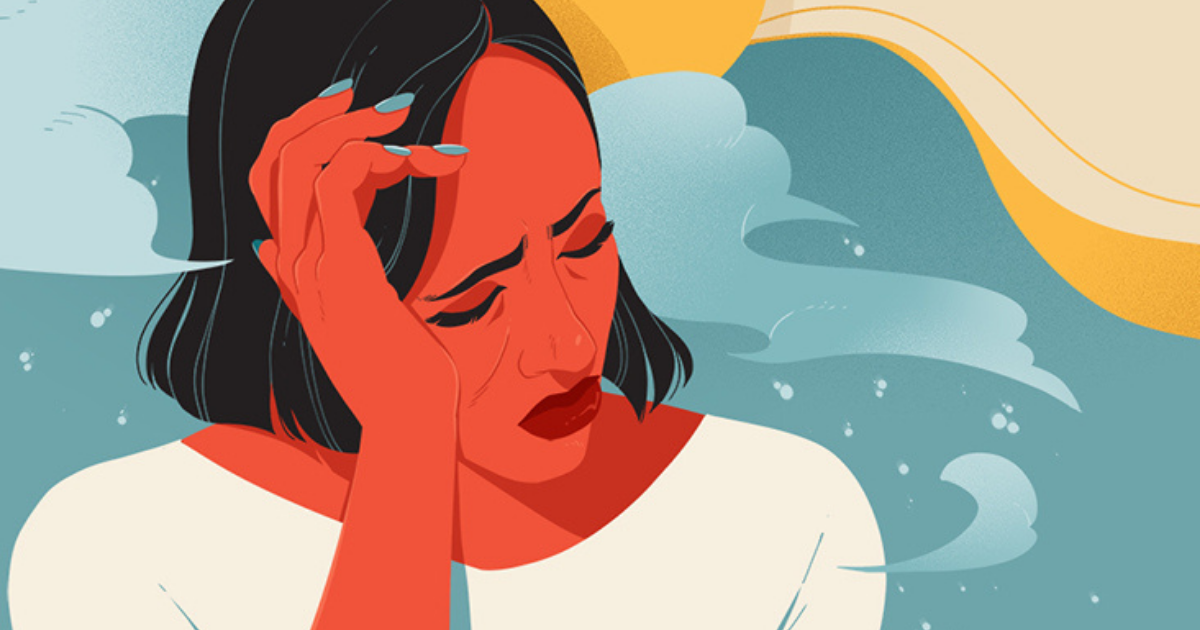Do you frequently experience migraines that frustrate the life out of you? Learn more about its causes and how birth control can help you cope.
Two types of headaches that are linked to your menstrual cycles
Tension headaches
There are different types of headaches that vary in terms of their causes and nature of pain. But one of the most common forms of headache pain (aka tension headaches) may be linked to your menstrual cycle. The pain resulting from tension headaches tends to spread across both sides of the head and you’ll also experience slight pressure.
A study conducted among 165 female patients established menstrual tension-type headache as a real disorder that could represent a variant of migraine headaches. Thus, some women do experience tension headaches around the time of their period.
Menstrual migraines
Women who experience migraines reported that the attacks usually occur either right before or during their periods. This is also known as menstrual migraine. (Source: The Migraine Trust)
A migraine is not merely a severe headache. Rather, migraine is a disabling neurological disease and headaches are only one symptom of migraines that can range in severity and length. It usually starts off as a one-sided throbbing headache, alongside other symptoms like nausea, dizziness, extreme fatigue, and increased sensitivity to light, sound or smells.
More often than not, migraine attacks can be spontaneous as well. Thus, it is easier to detect the causes of headaches as migraines typically have several common triggers without a single cause. These triggers may vary depending on individuals:
- Gender and hormonal shifts: Menstrual cycles and hormonal changes can cause menstrual migraines. In fact, migraine is three times more common among women than men and in the United States, it affects approximately 37% of women during their reproductive years.
- Allergies: Body irritation and inflammation as migraines are associated with the inflammation of blood vessels.
- Family history and genes: There’s often a hereditary link so you’re more likely to experience migraines if you have family members who suffer from the same problem.
- The environment: This covers a wide range of factors from changes in weather, stress, lack of sleep and even food.
Why you may experience headaches or migraines around the time of your period
Hormonal imbalance
The cause of menstrual migraines is best explained by a drop in estrogen levels during your period whereby sensitivity toward such hormonal fluctuations makes you more vulnerable to migraines. It can also happen if you’re pregnant or going through menopause.
Low iron levels
Another reason why you may experience headaches after your period is because of low iron levels after shedding blood and tissue during your period. Especially for those who usually experience heavy period flow, greater loss of blood may cause iron deficiencies and thus trigger headaches.
Hormonal treatment to prevent migraines
Maintaining hormone levels during your period
Birth control like the combination pill, progestin-only pill, patch and even vaginal ring are forms of treatments that can help to relieve symptoms of migraine through hormonal balancing. Not only do they help to stabilise estrogen levels by regulating hormones throughout your menstrual cycle, but they also reduce uncomfortable period symptoms. Low-dose estrogen birth control pills are normally recommended to prevent migraines as you can avoid experiencing a sharp drop in hormone levels during your period.
Skipping periods
Otherwise, you may also choose to opt for a continuous dose of the pill to reduce the likelihood of migraines. This essentially means you continue taking active, low-dose estrogen pills instead of placebo pills during the seven inactive days. Thus, the steady dose of estrogen should prevent the drop in hormones that usually occurs once you stop taking active pills on inactive days. Altogether, this should help you reduce the severity and frequency of migraines while experiencing lesser withdrawal bleeding.
If you’re on birth control that comes with the sugar (placebo) pills, simply skip them and start a new pack so that hormones are continuously released into your bloodstream.
That’s right, birth control isn’t just for preventing pregnancy as skipping periods may even improve your quality of life because of certain benefits! Besides potentially preventing migraines and headaches, birth control can also reduce symptoms associated with premenstrual dysphoric disorder (PMDD) and symptoms of your periods like menstrual cramps, bloating and even acne.
Lifestyle changes to cope with migraines
Although there’s no single cure for migraine, lifestyle changes can help you counter the negative effects. This includes:
- Regular exercise
- Adopting a healthy diet to avoid trigger foods
- Improving sleep habits
- Practising relaxation techniques (e.g. yoga, meditation)
Keeping a journal or record of your migraine episodes can also help you track patterns such as the duration and symptoms to identify potential causes. You’ll definitely be more well-equipped to deal with your migraines by recognising and avoiding triggers.
Need help?
If you do have a history of migraines, it’s best to consult a doctor before you begin a new birth control method. With Siena, you can even have your consults online and preferred birth control delivered straight to your doorstep for free!
References:
- American Migraine Foundation. (2021, January 21). What Is Migraine? https://americanmigrainefoundation.org/resource-library/what-is-migraine/.
- Arjona, A., Rubi-Callejon, J., Guardado-Santervas, P., Serrano-Castro, P., & Olivares, J. (2007). Menstrual Tension-Type Headache: Evidence for Its Existence. Headache: The Journal of Head and Face Pain, 47(1), 100-103.
- Edlow, A.G. & Bartz, D. (2010) Hormonal Contraceptive Options for Women With Headache: A Review of the Evidence. Reviews in Obstetrics and Gynecology, 3(2), 55-65.
- Penn Medicine. (2019, November 1). Migraine vs. Headache: How to Tell the Difference. https://www.pennmedicine.org/updates/blogs/health-and-wellness/2019/november/migraines-vs-headaches.
- Snyder, A. (2018, July 25). What Causes Headaches After Periods? https://www.healthline.com/health/headache-after-period.
- The Migraine Trust. (2020, January 2). Migraine and the contraceptive pill. https://www.migrainetrust.org/living-with-migraine/coping-managing/contraceptive-pill/
- WebMD. (July 10, 2020). Migraine and Hormones in Women. https://www.webmd.com/migraines-headaches/hormonal-migraine.
